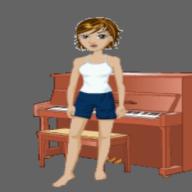Q1. I told her the news yesterday
A1. Ididn't tell her the news yesterday
Q2. Miss Lee finished the work on time.
A2. She didn't answer my question immediately.
Q3. They studied my plan carefully
A. They didn't study my plan carefully
我的答案對嗎?轉成過去式否定句,動詞不變,是否過去式否定句全部都要用didn't,會有其它變化嗎?THX
Answer the following questions with given word. Use the verbs in the SIMPLE PAST tense. You may use pronouns.
What did you find in her handbag? ( find a sharp knife )
I found a sharp knife in her handbag
Where did you meet Susan for the first time? ( in Paris )
I met her in Pairs for the first time
What did they catch the thief? ( on the roof )
They caught the thief on the roof.
更新1:
THX...............

